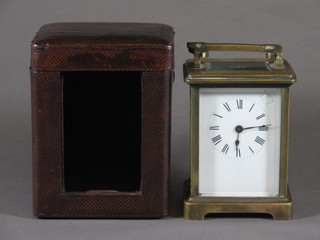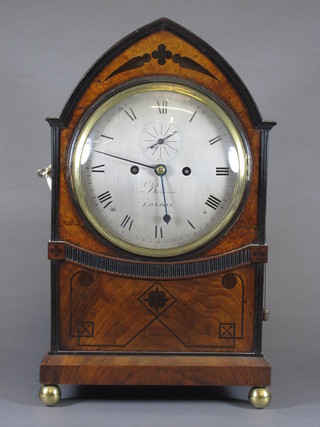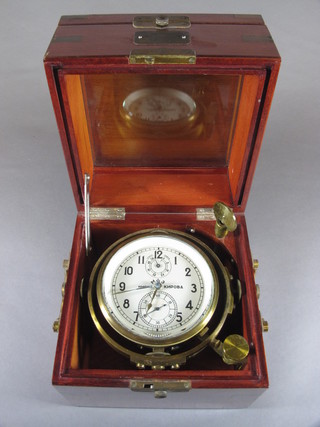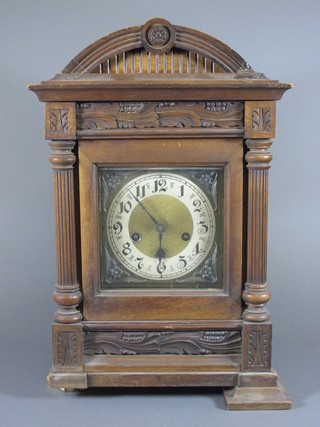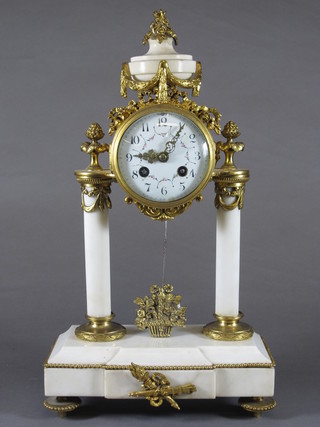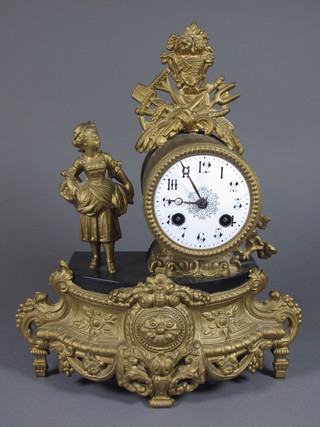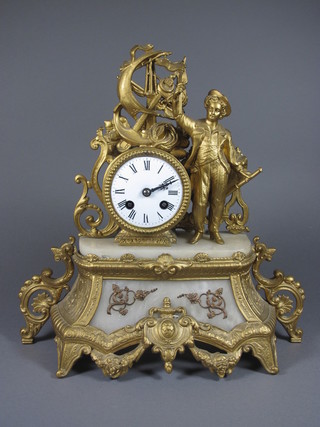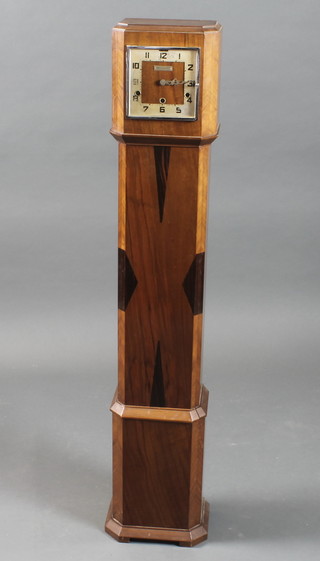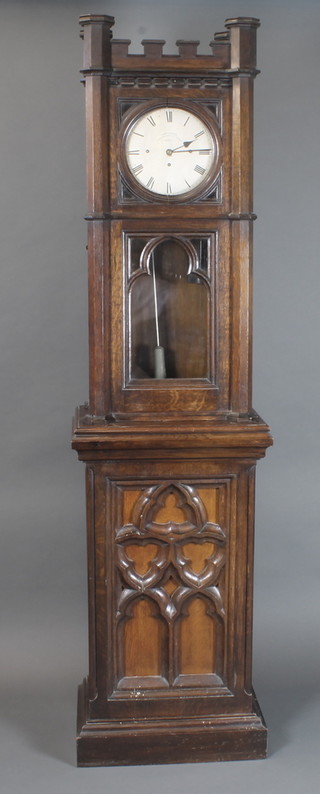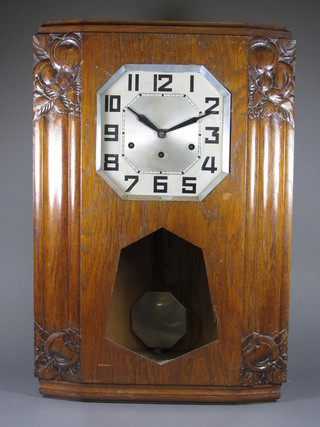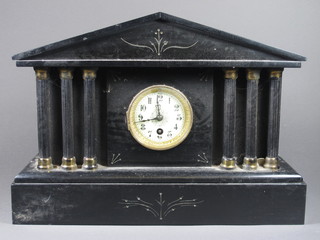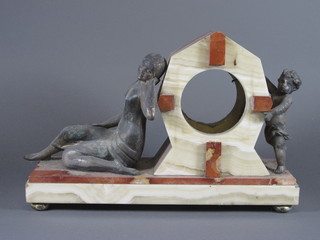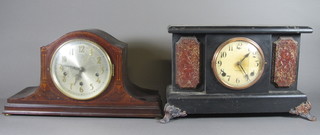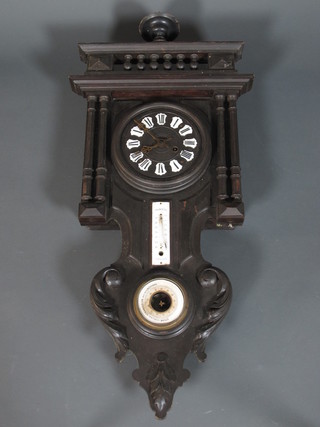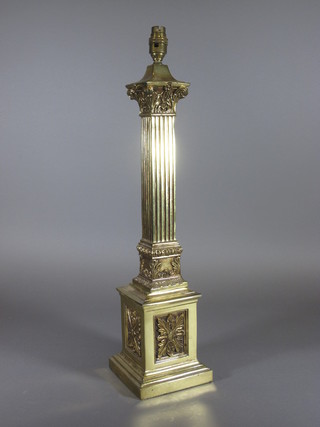Catalogue for our Antique, Fine Art and Collectables auction held on Wednesday 15th of May 2013
Auction Categories
Return to main sections
Viewing 1
4 sub categories viewing : Clocks, Watches and Timepieces
4 sub categories viewing : Clocks, Watches and Timepieces
description ( and estimated value in GBP )
226
An early 20th Century French brass carriage timepiece with corniche case and Roman enamelled dial, complete with a red leather travelling case 5"h x 3.5"w227
Barwise, London. A late George III mahogany and amboyna lancet cased bracket clock, parcel ebonised, having Roman silvered dial with second subsidiary dial, set 8 day repeating twin fusee movement with dead beat escapement striking bell, signed to back plate 17.5"h x 11"w x 7"dsold for £3300
228
A mid 20th Century Russian 5 day marine chronometer, having Arabic dial with remaining power dial and subsidiary second dial, housed within a brass mounted stained beechwood case 8"h x 7.5"w x 7.5"d ILLUSTRATEDsold for £420
229
A late Victorian walnut cased bracket clock of architectural form, having painted Arabic dial with breguet numerals, set 8 day 2 train movement chiming gong 18"h x 12"w x 9"dsold for £50
230
A mid 19th Century French Ormolu and white marble pendule du portique, having a foliate painted Arabic dial with breguet numerals, set within a drum case with 8 day cylinder movement with count wheel strike on bell, the plinth base centred with trophies in satire, on toupee feet, 16"h x 9.5"w x 4.5"d231
A late 19th Century French gilt spelter figural mantel clock, the drum case with Arabic painted dial, set 8 day movement with count wheel strike on bell 12.5"h x 10"w232
Of Maritime interest, a mid 19th Century French gilt spelter figural mantel clock decorated a sailor with nautical motifs, set Roman enamelled dial with 8 day movement having count wheel strike on bell 14"h x 15"w233
A 1930's walnut and macassar ebony Grandmother clock, retailed by Bravingtons Ltd London with Arabic silvered dial set 8 day movement, chiming gongs, 51"h x 9.5"h x 7"d234
John Smith, Midland clock works, Derby. A mid 19th Century oak tower clock, having a Roman silvered dial with outer minute track, set triple fusee movement striking 4 bells and chiming gong, the case in the Gothic taste with glazed door, raised on a blind fret cut pedestal, plinth base 77.5"h x 20.5"w x 13"d. John Smith of Derby set up business in 1856 following an apprenticeship with the celebrated Whitehurst family, the descendants of John Whitehurst 1713-88 of the Lunar Society fame. John Smith's business prospered as Northern Industrial towns flourished and many consequential buildings were fitted with Smiths clocks. The most celebrated example of their work is the great chiming clock in St Paul's Cathedral.sold for £1300
235
An Art Deco oak cased wall clock having octagonal silvered Arabic dial, set 8 day movement chiming gongs, the case with foliate relief carved decoration 25"h x 17"w x 6"dsold for £40
236
A late Victorian slate mantel timepiece of architectural form, having an Arabic enamelled dial, set 8 day movement, 12"h x 17"w x 6"d237
A French Art Deco rouge marble clock case surmounted by spelter figures of a cherub and reclining young girl 10.5"h x 16"w x 5"d238
A Sheraton style mahogany mantel clock having silvered Arabic dial with breguet numerals, set 8 day movement striking bell, af, the case inlaid with walnut and boxwood 10.5"h x 19"w x 6"d together with a Gilbert simulated slate mantel clock239
Aubert & Klaftenberger, 157 Regent Street, London. An unusual walnut floor-standing domestic regulator in the Gothic taste circa 1865. The single train movement with dead beat escapement, set silvered Roman chapter ring with outer minute track and second subsidiary dial, incorporating an unusual brass and glass rod pendulum, fitted 12 brass capped mercury vials with adjustment pointer to base. The case, with foliate carved and pierced cornice above a hollow high relief carved band of flowers, the door with arched apertures flanked by flower heads and lattice pilasters, raised on chamfered and shaped plinth base 79.5"h x 18"w x 14"d ILLUSTRATED FRONT COVER Aubert & Klaftenberger was created in 1835 by an International partnership of 2 watch retailers, the London based C.J. Klaftenberger and D.F. Aubert of Geneva. The firm was held in high esteem by Prince Albert, receiving regular orders for clocks and watches from 1845 onwards and favoured by both the Queen and the Prince as the supplier of watches to be presented as gifts. The Company was also contributor to the Horological Section of the Great Exhibition, winning the Honourable Mention from the Jury. In 1859 Aubert & Klaftenberger were awarded a Royal Warrantsold for £9500
240
A Dutch wall clock, fitted a thermometer and barometer, case wormed251
A gilt metal Corinthian column table lamp 20"sold for £50
